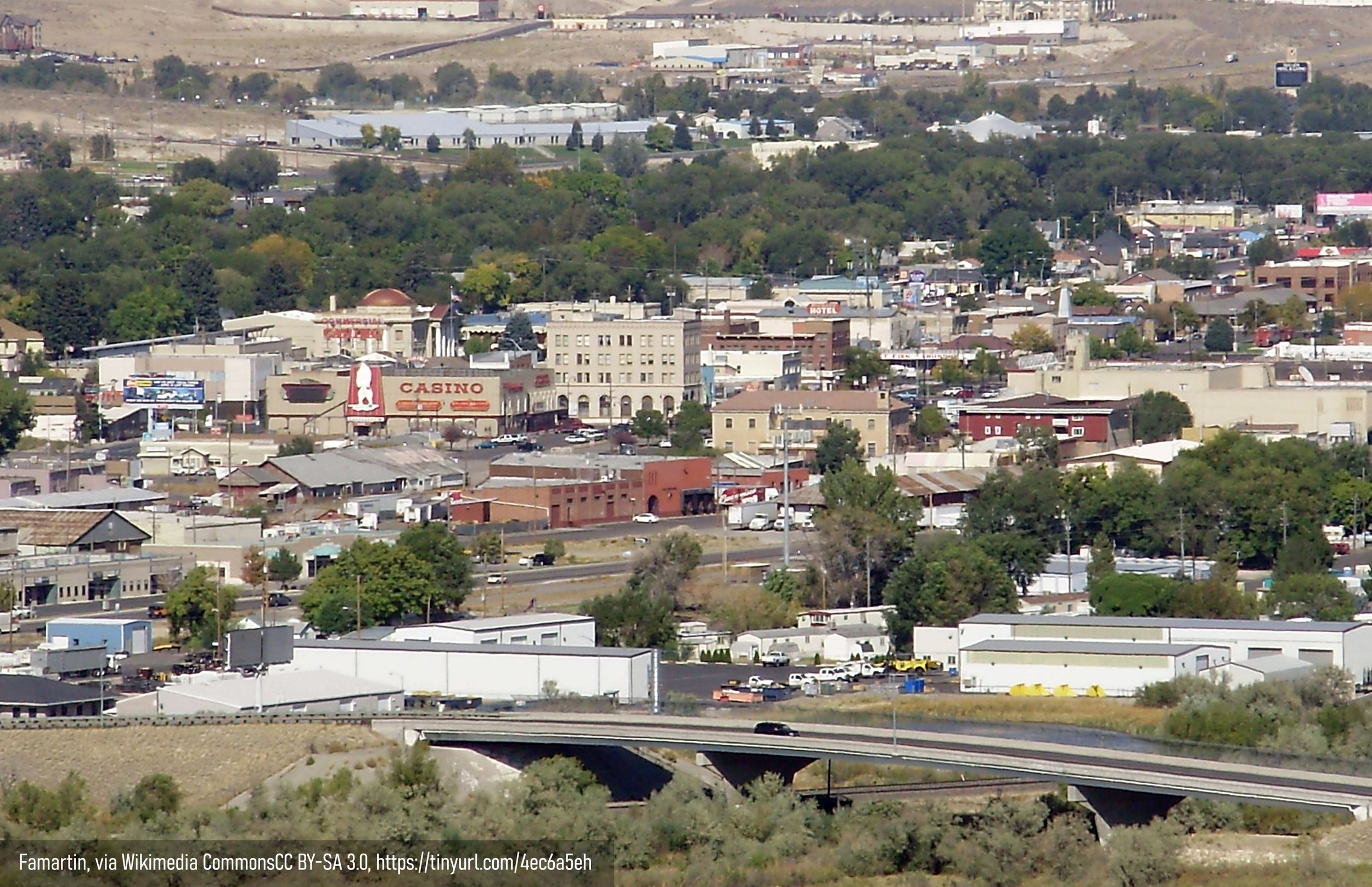Could your church become a “giving machine”?
Two small congregations in Elko, Nevada, are making a community impact disproportionate to their size.
The following story highlights the community impact of one of our valued clients. We hope it provides practical insights for your life-changing work. Do you have an encouraging story to share? Please email us.
By Roy Harryman
Ministry Pacific
Last year, Elko, Nev., became the world’s smallest town to receive a Light of the World Giving Machine.
A what?
A Giving Machine accepts electronic payment and directs donations to the charity of your choice. It’s like a pop machine, only it “sells” services such as education, famine relief, housing and healthcare – all to serve people in need.
Although The Rev. Julie Vice didn’t invent the machine (that was done by The Church of Jesus Christ of Latter-day Saints), she championed the idea and promoted it to her church members. They made contributions and also volunteered in the cause.
The effort paid off. In December of 2024, the machines in Elko received about $75,000 in contributions – with approximately $40,000 going to local causes.
Elko, Nevada, residents line up to make a contribution through a Light of the World Giving Machine.
The church as a “giving machine”
The metaphor of a giving machine epitomizes Julie’s idea of how a church should operate. The pastor herself is a sort of giving engine in her northeast Nevada town of about 30,000. Her job requires double duty, serving part time at both St. Paul’s Episcopal Church and Faith Lutheran Church. It’s clearly a labor of love.
After a career in mental health and special education, Julie felt a “holy two-by-four to the head” – a calling from God to enter the ministry: “I said, ‘OK God, you win.’”
Following graduation from seminary in 2019, she began ministry in Elko the following year. The pastor immediately had her work cut out for her: The pandemic hit both churches’ attendance hard, leaving about 20 people in each congregation.
“I thought, ‘We’re going to have to be creative,’” she said. That conclusion led her to look beyond the walls of her churches.
“One of the big things for me is being in the community. If something good is going on, I try to be a part of it. You end up building connections with people.”
As a result, Julie and her congregants have been involved in outreaches including:
Trunk-or-Treat safe Halloween nights.
A Thanksgiving day meal and hospitality for the community’s homeless.
Delivering Thanksgiving food to residents of a local humanitarian camp – a designated living space for people without shelter.
Organizing the ever-popular community Easter egg hunt.
Sharing church space with a local nonprofit that facilitates foster care and guardianship.
Clockwise from top left: Ministry at a community animal shelter; a trunk-or-treat Halloween event; Elko students sharing their enthusiasm for the Light of the World Giving Machine (Facebook: Giving Machines - Elko).
Community outreach on a budget
Some of Julie’s ideas began germinating in seminary when a professor asked, “If your church closed tomorrow, what would people miss?”
With a combined total of about 40 parishioners and an essentials-only budget, ministry has been characterized by imagination and partnership.
“If I had thousands of dollars to do outreach, it would be easy,” she said. “We’re looking for ways to be creative with the number of people we have and the number of dollars we have. There were a lot of things we were doing as a church that could also be shared in the community.”
In addition to leading her congregation in community service, Julie serves on local nonprofit boards. One of these is called F.I.S.H. (Friends In Serving Helping). It operates a shelter, thrift store, food bank and other support services.
Julie has found her service on the F.I.S.H. board works in tandem with her pastoral roles, which also involve caring for people in need.
“I can access their resources and they benefit from our help,” she said. “It’s bridge building.”
One idea in the development stage is providing community laundry services. Originally, she and other faith leaders considered purchasing and housing washers and dryers. Now, they’re leaning toward choosing one day a month and offering to pay the tab at a laundromat. That still makes a difference, but lowers the cost and potential liability for sponsors.
Another idea underway could impact all of Elko. The city wants additional parkland, and Faith Lutheran has proposed some of its property for that purpose. Its offer has been tentatively accepted by the city. While the congregation owns six acres, parishioners feel they only need two. They say the land is not creating value sitting idle.
“I hope they name it Faith Park,” Julie said.
Elko, Nevada
Giving in tandem
The Giving Machines were warmly received in Elko, receiving media attention and the support of the mayor and other VIPs.
It's an example of congregations demonstrating compassion to people in need. But goodwill can’t stop there. To make an outsized impact, churches must also extend a hand to fellow organizations who share in the work.
Julie was aware of the differences between the machines’ primary sponsor, the Mormon Church, and her own faith traditions. In addition, the campaign involved partnering with the local Catholic church. Those distinctions could have been a deal breaker. But they weren’t.
“We don’t have to agree theologically to do good works together,” Julie said. “If people are doing good works, let’s be a part of it and not get hung up on who gets the credit.”
How can your church partner in the community?
It’s easy for leaders to think up ideas for community ministry. But how can they get church members involved? The Rev. Julie Vice offers these suggestions:
• Create an opportunity that is “doable” and practical. Although some may still be intimidated, each act of service expands people’s comfort zone.
• Follow up the initial win with another volunteer opportunity.
• Be a grassroots cheerleader. Help members develop confidence: “I know you can do this! I believe in you.”
• Provide a mix of projects that do/do not require physical labor. This ensures people of all abilities can do something.
• Ensure each act of service has a clear beginning and end. Maybe it’s a singular opportunity to help for one hour. Maybe it’s an annual event. Don’t create the impression that volunteering is an open-ended commitment.
• Provide different types of opportunities. Some people are gifted at tasks, but struggle with social interaction (and vice versa).
Contact The Rev. Julie Vice at therevjulievice@gmail.com.
Roy Harryman is communications coordinator for Ministry Pacific Insurance Services. Contact him at roy@ministrypacific.com.







